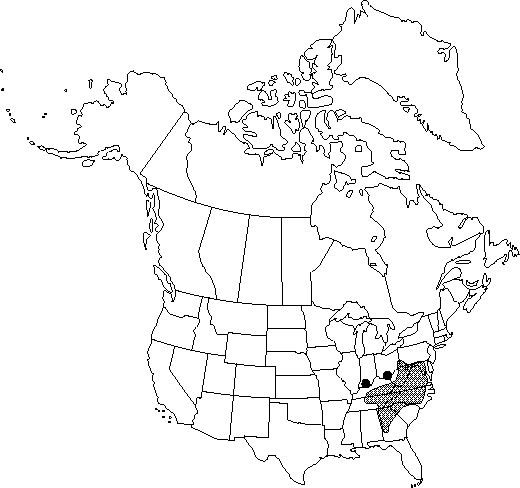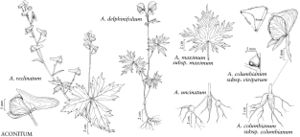Difference between revisions of "Aconitum uncinatum"
Sp. Pl. ed. 2, 1: 750. 1762.
FNA>Volume Importer |
FNA>Volume Importer |
Revision as of 19:55, 24 September 2019
Roots tuberous, tubers distally not obviously bulblike, 10-30 × 5-15 mm, parent tuber producing several (ca. 5) daughter tubers separated from parent by connecting rhizomes 5-30 mm. Stems erect, reclining or climbing, 3-25 dm. Cauline leaves: blade 3-5-divided, usually with more than 2 mm leaf tissue between deepest sinus and base of blade, 4-10 cm wide, segment margins cleft and toothed. Inflorescences open racemes or panicles. Flowers commonly blue, 2.5-5 cm from tips of pendent sepals to top of hood; pendent sepals 10-18 mm; hood conic-hemispheric, 15-27 mm from receptacle to top of hood, 13-24 mm wide from receptacle to beak apex.
Phenology: Flowering late summer (mid Aug-late Sep).
Habitat: Wet areas along streams and in springs, also less mesic locations in woods and clearings
Elevation: 200-2000 m
Distribution

Ga., Ind., Ky., Md., N.C., Ohio, Pa., S.C., Tenn., Va., W.Va.
Discussion
Aconitum uncinatum grows in the Appalachian Mountains, on the Piedmont, and on the upper Atlantic Coastal Plain. It is a relatively homogeneous group divided into two intergrading subspecies by J. W. Hardin (1964).
Daughter tubers and connecting rhizomes are seldom present on herbarium specimens because they are easily dislodged during collection.
Available information suggests that Aconitum uncinatum is probably not one of the extremely toxic aconites (D. E. Brink 1982).
Selected References
None.
